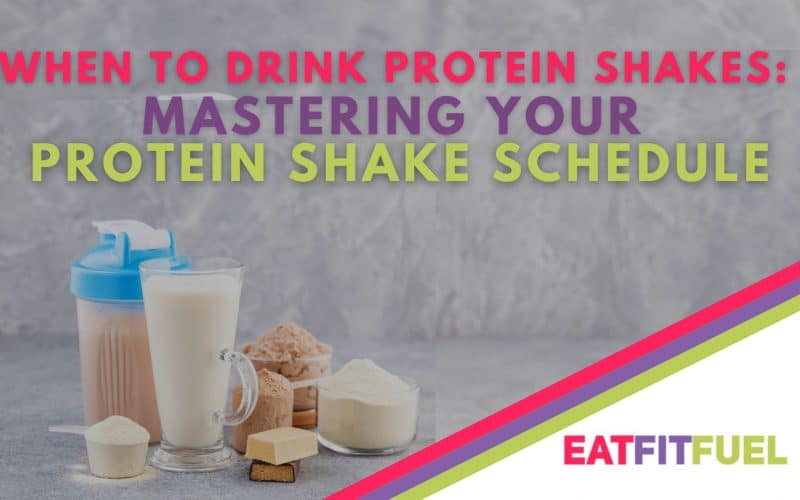Protein supplements are one of the most popular supplements globally. They are used for muscle building, weight loss, and overall health improvement. According to projections, the worldwide market for protein ingredients is expected to skyrocket to over $114 billion by 2030. That’s a massive increase from the 2021 figure of $72 billion.
Understanding the foundational role of protein in your body will help you maximize its benefits. It will also help you make the most out of investing in protein shakes. Additionally, it will help you understand how to take and when to drink protein shakes.
Overview
The Science Behind Protein Consumption
The Different Types of Protein and Their Impacts
The Debate: Pre-Workout v.s. Post-Workout Protein Intake
Protein Timing Based on Fitness Goals
The Anabolic Window: Myth or Reality?
The Night-Time Protein Intake
Key Takeaways
Frequently Asked Questions (FAQs)
Conclusion
The Science Behind Protein Consumption
Protein plays a vital role in growing and repairing damaged tissues. The amino acids in protein are essential macronutrients that play many crucial roles in the body. They are vital for physiological processes, and one of them is muscle growth and repair.
When we exercise, especially with strength training, we create small tears in our muscles. But when we consume protein that has essential amino acids, these repair the muscle tears and build them bigger and better. Without adequate protein intake, our bodies will not be able to properly rebuild these torn muscles.
The Different Types of Protein and Their Impacts
Not all proteins are created equal. Some are easily absorbed by the body while some take more time. Some proteins contain all the essential amino acids needed by the body while some don’t. Understanding the types of protein will help you choose and schedule your consumption better.
Whey protein is quickly digested, and it contains all the nine essential amino acids. This makes it ideal for consumption after working out to help with muscle recovery.
Soya and casein are plant-based protein sources. They provide a steadier supply of protein over a longer time, so they’re also good for muscle recovery.
When it comes to plant-based protein sources, some of them don’t contain all the essential amino acids, but that doesn’t make them inferior. Vegan protein powders are usually a mixture of more than just one plant-based protein source to make sure that you’re getting all the amino acids that you need.
The Debate: Pre-Workout v.s. Post-Workout Protein Intake
We’ve established that consuming protein is important for muscle growth and repair. However, many people are confused about when to take them, and it’s been a widely debated topic by experts. We all want to know when to drink protein shakes to maximize their benefits.
Research shows that consuming protein after a workout can synthesize muscle protein better. The rate of muscle protein synthesis is higher in the first 2 hours after resistance exercise.
However, some research also supports that consuming at least 20 grams of protein pre-workout may help lessen muscle damage and accelerate recovery.
To end the debate though, the International Society of Sports Nutrition suggests that consuming protein within 2 hours after exercise is optimal for muscle growth.
Protein Timing Based on Fitness Goals
Everyone’s fitness goals are different. Some of us exercise for health benefits, some to build muscle, and some to compete in sports. Knowing when to drink protein shakes for your specific needs and goals is important.
If your goal is to build muscle, consuming protein before and after workouts is recommended. It will help you reduce muscle damage, speed up recovery, and maximize muscle protein synthesis. Aim to consume 20 grams of protein before exercising and 40 grams of protein after your workout.
For endurance training, you need to combine protein with carbs before and after exercising. This will improve your performance and recovery and reduce muscle soreness. It will give you the energy that you’ll need while training while still helping your body recover.
For the elderly, the time of protein consumption isn’t as vital. It’s more important to spread protein consumption throughout the day to optimize muscle protein synthesis. Dieticians also recommend that they consume more protein than adults to prevent muscle loss.
The Anabolic Window: Myth or Reality?
Anabolic window refers to the short time frame after training where your body is primed for muscle growth. The traditional wisdom states that protein must be consumed immediately after exercising to take advantage of this window.
However, newer research shows that the concept of a post-exercise anabolic window may not be as time-sensitive as previously believed. The window for nutrient intake may extend several hours after exercise. It is therefore suggested that getting adequate total protein spread throughout all meals is more important than being strict about the post-workout window.
With all of this focus on when to drink protein shakes, many people forget to maximize another time that is often overlooked. Nighttime is when muscle recovery takes place, which is just as important as exercise and nutrition.
The Night-Time Protein Intake
Consuming protein before bed can help promote muscle repair, growth, and adaptation.
Casein is a very good example of this protein. It is digested slower than whey, providing sustained protein levels as we sleep. One study showed that consuming casein protein before bed led to a 22% increase in muscle building overnight compared to a placebo.
Dieticians recommend consuming 30-40 grams of protein 30 minutes before bed. Greek yogurt and cottage cheese are examples of casein-rich foods that you can consume.
Key Takeaways
- Protein plays a vital role in growing and repairing damaged tissues. This is why it’s important to consume enough protein when you aim to grow your muscles or when you are physically active.
- Consuming protein before and after workouts helps build muscle and speeds up recovery. Dieticians recommend at least 20 grams of protein pre-workout and up to 40 grams of protein post-workout.
- While the timing of post-workout protein consumption matters, total daily protein intake is more important. Remember to spread your protein consumption throughout the day.
- Consuming casein protein before bed provides you with sustained protein release overnight, which aids in muscle growth and repair while you sleep.
Frequently Asked Questions (FAQs)
Can I drink a protein shake on an empty stomach?
Yes, but it is better to consume a protein shake as a small snack instead. Some individuals report that they experience an upset stomach when they consume protein shakes without food.
Are all protein shakes suitable for vegans and vegetarians?
No, because whey and casein shakes contain milk derivatives. Opt for plant-based proteins like pea, hemp, rice, or soy if you’re a vegan or vegetarian.
Can I drink protein shakes if I’m lactose intolerant?
Most forms of whey protein are formulated with low lactose, which makes them easily digestible. Lactose-free protein shakes are also available in the market. But if you still get an upset stomach with whey protein shakes that claim to be low-lactose, it’s better to opt for plant-based protein shakes.
How do I ensure that the protein supplement that I choose is safe and clean?
Check out the ingredients list and aim for shakes with minimal additives. You can also look out for certifications like Informed Sport Certification to ensure high-quality ingredients and manufacturing processes.
Conclusion
Protein is an important macronutrient that everyone needs. It’s important to understand what kind of protein you’re consuming because not all proteins are made equally. Some are easier to digest while others take more time. Each of them has their pros and cons.
It’s also important to check if animal-based or plant-based proteins are better for you. Vegans, vegetarians, and lactose-intolerant individuals should go for plant-based proteins.
An understanding of your fitness goals will help you better determine what and when to take protein supplements. Understanding when to drink protein shakes will help you build and repair muscle over time. Overall, it is more important to reach your daily protein needs and to spread your consumption evenly throughout the day.






